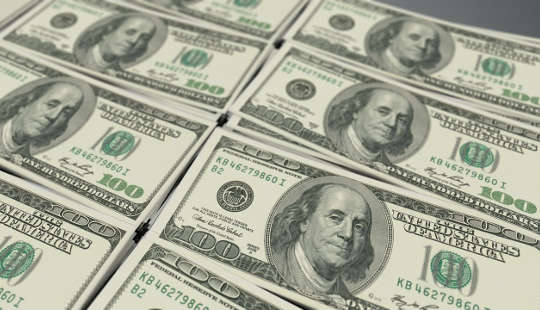
Image by 3D Animation Production Company
The United States was founded at the dawn of the Industrial Revolution, and has met with extraordinary business success from the days of its founding. Upon that success was built the broad prosperity of the new nation and the opportunity for great fortunes for the bold.
The United States was blessed from the outset with perhaps the best land in the world, with abundantly fertile soil, a superb river system, and oceans that buffered it from its enemies. Wealthy colonials had organized massive land companies well before the American Revolution, and real estate was and still remains an outsized part of the American business story.
After unshackling itself from Britain, our new country plunged headlong into the manufacturing revolution, then quickly matured into the world’s largest manufacturer within decades of its founding with early manufacturing innovations in such places as Philadelphia, Pennsylvania; Paterson, New Jersey; and Lowell, Massachusetts.
In this foment, American business became the world’s greatest innovator, with inventions from telegraphic codes to telephones, from electric lights to power-generation plants, from plastics to the internet itself. Basic science and rigorous research and development were often at the very heart of business progress. This innovative, inventive spirit became a constant facet of American business success.
With each breakthrough, new fortunes were amassed and new opportunities were created for millions of Americans.
America became a country of transportation, from the earliest toll road and canal companies to the almost century-long, tumultuous domination of the railroad industry, to the 20th century web of roads and highways to serve the automobile revolution. The mammoth steel, coal power, and petroleum industries that tower above much of U.S. business history can be interpreted as suppliers to the transportation industry.
Dominating the Economic World
The United States quickly dominated the economic world. By the 1870s, less than 100 years after its founding, it had grown larger than any European economy in both population and gross domestic product (GDP), and shortly thereafter surpassed the huge but preindustrial China to become the largest economy in the world. In business, the companies with the largest markets usually prevail since with greater scale they have greater profits and thus more resources to reinvest in growth and innovation. American companies were now in the world’s largest domestic economic market, and so they soon became the most advanced.
By World War I, the U.S. economy was almost as large as those of England, France, and Germany combined. And by the conclusion of World War II, U.S. business dominated the global economy. The U.S. economy constituted more than 25 percent of the world’s GDP, the nation had a broad and thriving middle class, the United States had become by far the world’s wealthiest country, and such companies as General Motors, DuPont, General Electric, and IBM had become global business giants.
Along the way, the United States has contended with five main rivals in business. First, it fought for more than a century for manufacturing supremacy with Britain, waging wars and near-wars at fraught moments along the way. At the moment when the United States had become so large that its rivalry with Britain abated, it began a struggle with Germany for military and manufacturing supremacy that spanned two world wars.
Next came its Cold War with the U.S.S.R., a contest between two vastly different political systems in which U.S. economists were briefly but wrongly convinced that the Soviet economy had surpassed that of the United States.
As the Soviet rivalry crumbled, Japan emerged to vie with the United States in manufacturing, especially in the all-important automobile sector, and for another brief moment Americans feared that Japan’s economy would overtake its own.
Continuing to Meet the Challenges
Our continued prosperity will be a function of our ability to continue to meet the challenges of these rivals and build on our bold business success.
China has now emerged as the latest rival and the only one yet with a population larger than the United States’, spurring a contest for leadership in critical emerging technologies such as genetic engineering, advanced telecommunications, supercomputing, artificial intelligence, virtual and augmented reality, electric vehicles, alternative energy, and much more. In each of the areas deemed crucial to the future of business, China is pouring in resources with the overt objective of gaining global leadership and capturing markets in Europe, Japan, and beyond.
China’s sheer size, coupled with its focused determination, means that it will bring the greatest business challenge we have yet faced. It will take all the moxy, focus, creativity, and spirit we can muster to meet this challenge.
Whether viewed through the lens of real estate, finance, agriculture, industry, or other sectors, the story of American business has been extraordinary, with outsized characters and breathtaking achievements.
Our broad prosperity has been the product of these achievements. The echoes of this illustrious past, with the many challenges we have met and overcome, and our nation’s seemingly endless fount of creativity and energy, gives us every reason to believe that we will yet again prevail.
Copyright 2022. All Rights Reserved.
Book by this Author:
The Case for a Debt Jubilee
The Case for a Debt Jubilee
by Richard Vague Soaring debt burdens individuals, stifles growth, compounds inequality, and brings falling living standards for millions.
Soaring debt burdens individuals, stifles growth, compounds inequality, and brings falling living standards for millions.
Richard Vague’s new book argues that, contrary to mainstream assumptions, we cannot simply hope that the trend will correct itself. Mounting debt is a feature of our economic system, not a bug: debts perpetually grow and compound, polarizing and impoverishing economies if not overtly dealt with. He offers a detailed plan for how we can restructure a range of debts – such as student loans, auto loans, medical debt and more – and offer hard-pressed debtors a ‘jubilee’ now, not in some utopian future.
Vague’s bold polemic contains a wealth of ideas that will free millions from modern-day debt peonage, reduce inequality and bring new vigor to the economy as it struggles to emerge from the pandemic.
For more info and/or to order this book, click here. Also available as a Kindle edition.
About the Author
 Richard Vague is Secretary of Banking and Securities for the Commonwealth of Pennsylvania. Prior to his 2020 appointment, he was managing partner of Gabriel Investments and chair of The Governor’s Woods Foundation, a nonprofit philanthropic organization. Previously, he was co-founder, chairman and CEO of Energy Plus, an electricity and natural gas company. Vague was also co-founder and CEO of two banks and founder of the economic data service Tychos.
Richard Vague is Secretary of Banking and Securities for the Commonwealth of Pennsylvania. Prior to his 2020 appointment, he was managing partner of Gabriel Investments and chair of The Governor’s Woods Foundation, a nonprofit philanthropic organization. Previously, he was co-founder, chairman and CEO of Energy Plus, an electricity and natural gas company. Vague was also co-founder and CEO of two banks and founder of the economic data service Tychos.
His new book is The Case for a Debt Jubilee (Polity Press, Nov. 22, 2021). Learn more at richardvague.com.
More books by this Author.























